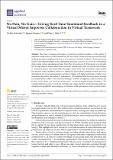No Pain, No Gain—Giving Real-Time Emotional Feedback in a Virtual Mirror Improves Collaboration in Virtual Teamwork
Author(s)
Schneider, Nicklas; Vazquez, Ignacio; Gloor, Peter A.
Downloadapplsci-14-05659-v2.pdf (4.388Mb)
Publisher with Creative Commons License
Publisher with Creative Commons License
Creative Commons Attribution
Terms of use
Metadata
Show full item recordAbstract
This study investigates the impact of real-time emotional feedback on the quality of teamwork conducted over videoconferencing. We developed a framework that provides real-time feedback through a virtual mirror based on facial and voice emotion recognition. In an experiment with 28 teams (84 participants), teams collaborated over Zoom (version 5.16.6) to set up a virtual Mars station using custom simulation software (Mars Star City, version 4.0). Participants were divided into 14 experimental teams, which were shown the virtual mirror, and 14 control teams without it. Team performance was measured by the improvement in the Mars simulation output quality. Our analysis using correlation, multi-level regression, and machine learning revealed that fewer interruptions but an increasing number over time correlated with higher performance. Higher vocal arousal and happiness also enhanced performance. We confirmed that female presence in teams boosts performance. SHAP values indicated that high variability in happiness, head movement, and positive facial valence—an “emotional rollercoaster”—positively predicted team performance. The experimental group outperformed the control group, suggesting that virtual mirroring improves virtual teamwork and that interrupting each other more while speaking less, leads to better results.
Date issued
2024-06-28Department
Massachusetts Institute of Technology. Center for Collective Intelligence; System Design and Management Program.Journal
Applied Sciences
Publisher
MDPI AG
Citation
Schneider, N.; Vazquez, I.; Gloor, P.A. No Pain, No Gain—Giving Real-Time Emotional Feedback in a Virtual Mirror Improves Collaboration in Virtual Teamwork. Appl. Sci. 2024, 14, 5659.
Version: Final published version
ISSN
2076-3417